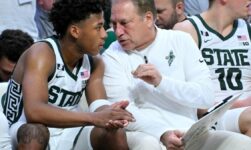CBS Sports’ Gary Parrish and Matt Norlander surveyed roughly 100 coaches for our annual Candid Coaches series. They polled everyone from head coaches at elite programs to assistants at small Division I schools. In exchange for complete anonymity, coaches provided unfiltered honesty about a number of topics. This is the final poll question in our summer survey on the state of college basketball.
The NCAA is in the process of overhauling its rulebook and infrastructure, a mammoth undertaking by the Division I Transformation Committee that will redefine and (ideally) streamline what it means to be a D-I program moving forward. College basketball stands to be impacted by this in significant, if still undetermined, ways.
For as much worry, intrigue and curiosity that exists over what’s to come, those feelings are buttressed against the thrum of the past five years. College basketball has undergone — through fits and starts — constant change and been hit with a barrage of off-the-court headlines and legislative reworks that have kept the sport somewhat off-balance. It started almost five years ago to the day, when the FBI announced its covert investigation into bribery and fraud in recruiting.
Since then, a Mark Emmert-appointed commission was formed, mostly didn’t do anything to change basketball, and dissolved. The IARP was formed, has only adjudicated one case to date, and will be disbanded come 2023. NIL legislation, the transfer portal, a global pandemic, new transfer rules, emergence of the G League and Overtime Elite, conference realignment and even Baylor winning a national title have all transpired in recent years. What was once unthinkable became reality.
It would be an exaggeration to state college basketball is at a crossroads. But it’s a tender time — depending on the lens one looks through. Our final question in this year’s series is a sport-wide temperature check.
How do you feel about the state of college basketball in 2022?
Great24%Good24%Ambivalent9.4%Concerned42.6%
Quotes that stood out
Great
• “The landscape is changing with the transfer portal, NIL, COVID bonus years, etc., but the mission still remains the same. Players/teams get incredible exposure through monster TV deals, they are provided with educational opportunities because of the game of basketball, and young people get the opportunity to play college basketball on the national stage.”
• “There are many challenges that have come up in the last few years (NIL, portal, COVID-19). The NIL and portal were necessary changes in my opinion. We just need to implement some better standards and guidelines in both cases. COVID-19 taught us that the sport can withstand a crisis and now that we are (hopefully) through the very worst of it, the sport is in a stronger place. I thought the 2022 NCAA Tournament was phenomenal, ending with an awesome Final Four.”
• “College basketball is in a great spot. Talent level will be strong. Guys are sticking around because of possibilities to make money. Should be a great season, and will only continue to get better. Especially with college hoops being abnormally old.”
• “It’s still the greatest show on earth with the greatest winner-take-all tournament.”
Good
• “College basketball is the best f—— thing in the world. It’s really good, fun to be around and I’m blessed to be able to do it, but there’s also concern. Concern for the product, the student-athletes we’re putting out into society based on their experience with college athletics. How few of them are able to maintain a profession in this spot and what that means in terms of their habits once they leave. A big part of why we coach is to prepare young people for those things, when they can draw from these experiences when s— matters. When you have to go get a job and perform and now your livelihood is impacted by that differently. That’s where I think there’s a difference in terms of what’s at stake.”
• “We’re all getting paid quite well, the players are getting a cut, the facilities are nice, and I damn sure like private plane travel. What is not to like?”
• “I think it’s strong enough and there’s enough excitement around it. Yes, there’s a lot of negative things that are happening in some people’s eyes with the transfer portal, NIL and conference realignment. … College basketball is going through a lot of changes, it has always evolved, people have adjusted to it and that’s where we are now. When they added the 3-point line, then pushed it back, there’s been change that people have thought ‘Man, what’s going on with the game?’ but it always ends up surviving.”
• “A number of great players stayed in college. Teams will still be older with the combination of NIL keeping some of those players and COVID eligibility still impacting things. I think this will make for terrific nonconference games and conference races. Concerned some about where conference realignment turns next and what that potentially means for the NCAA Tournament.”
Ambivalent
• “It is a completely different job. It is a different business. Different skillset required. Without a governing body and the ability to do whatever you want, in many regards, the model is unlike any there has ever been. I have said hundreds of times over the last 18 months: There will be more coaches hired/fired and retired in these next five years than any 10-year period in the history of college athletics.”
• “Game-changing variables have been introduced in such a short period of time. Personally, I hope to be on the right side of change before I’m left out.”
• “The bottom line has always affected ethics and our decision-making. The bottom line from TV contracts is impacting everything from this. Folks are super-greedy and our game is the best it’s ever done financially, but I’m concerned with the amount of greed to distort and change it, to make more and bigger power conferences.”
Concerned
• “(There are too many) commissioner- and president-driven decisions that put basketball in the hands of football-centric decision-makers more than ever. (You have to) run your program with a front office/coaching mix, in that order, and you’ll be able to compete. (You have to) get one or two administrative people that have a genuine seat at the school’s decision-making and priority table — and then you have a chance. Without that, you’ll be run over by football decisions and entitled boosters.”
• “No direction or leadership. We need a college basketball leader that sits and works with the head of the NCAA. Also got to start thinking of college basketball without football. Might not be a bad thing. Proactive, not reactive.”
• “We are the only sports entity where every day is free agency.”
• “Initial meetings with kids now, it used to be about, ‘Am I going to start, how much playing time am I going to get?’ Now that’s the last thing on the list. The portal, that whole thing is a disaster. Tampering is a disaster. These things are good for the student-athlete, but the ideal and what it’s supposed to be is all great, but that’s not what’s happening right now. How do you build rosters, teach lessons, fight through adversity?”
• “Every rule has taken control away from the coach and given it to the teenagers. Every new rule is anti-program building but pro-individualistic. The coach has less control over his program than ever before.”
• “NIL combined with transfer portal combined with Overtime Elite and the G League Ignite combined with conference realignment (because of football and TV revenue) combined with a lack of leadership in NCAA makes for very unstable ground. If you don’t know where you want to go, any road will get you there. Feels like we don’t know where we want to end up with all of this.”
• “We don’t have great leadership from the NCAA and need a strong personality with great knowledge about the college basketball landscape to provide guidance at a pivotal time.”
• “The transfer portal is the least of my concerns. I wouldn’t say that if I was at a mid-major. But NIL is the biggest. To boil it all down, every organization and every entity comes down to leadership. We have a leadership vacuum at the NCAA level. I think we’ve got good leadership at the NABC level. I think Craig Robinson’s doing as good of a job as he can do. We need absolute autonomy as a sport and we have to figure out what’s best for our sport as a whole. … The problem basketball coaches run into: the presidents want men’s basketball to be treated just like every other sport and we’re not like every other sport. We’re different than field hockey, baseball, lacrosse. I think every sport should be given that autonomy to some degree.”
Basketball’s national popularity may be helped, or hurt, by looming NCAA policy changes.
Getty Images
The takeaway
How healthy is college basketball in 2022, anyway? It’s a fabulous game, of course, with the best postseason in American sports. But how many unresolved issues need addressing, changes that can positively serve the most people and better the game moving forward?
In hearing the coaches’ stances, there’s a lot of disagreement. We had a healthy spread of votes for all four options, but it’s no shock which won. Concerned took it comfortably, though it still fell moderately short of earning half the votes. A positive sign when you consider coaches are complainers by nature. I also received pithy feedback re: concern over the lack of timeliness for penalties against Kansas, Arizona, LSU and Louisville in those IARP cases. Beyond that, regulation of NIL remains a major sticking point.
Some of these coaches are lost on how to navigate their jobs in a world where players can earn hundreds of thousands of dollars. It’s just not the gig it was for the past 80-plus years and we’re still in an adjustment period.
Whereas some coaches homed in on NIL or transfer portal, others voiced concerns about the Big Ten and SEC having downstream effects on how smaller conferences are treated when we look in up five years’ time. It’s undeniable that college basketball is a significantly different entity from five years ago.
Candid Coaches
Another issue, one that’s heavily swayed through coaches’ perspectives, is the notion that the sport’s moral center is rotting away because players can transfer freely. Whether or not you agree with that, two points here: 1) The Division I Board of Directors recently rejected a proposal that would allow for multiple transfers without having to sit a year, so that concern is not as prominent now as it was when we conducted this survey, and 2) There is a belief among many coaches that, even if they want to coach in a way that holds 18-, 19- and 20-year-olds accountable, they can’t, lest they lose an extra player or three to transfer at year’s end.
“It makes it really hard as a college coach to put your best foot forward and coach guys and be tough and to help guys get through the struggles,” one coach said. “I think that’s when kids are at their best, when they face adversity and have to overcome things. The way it is now, any trouble, any adversity, anything that doesn’t go perfectly right, it’s too easy for them to quit. It puts all the blame on everyone else and very little accountability for the kids. I think it’s a bad message for young men in general.”
As for the big picture, nearly a dozen coaches I spoke with said college hoops would be in a better spot if it was able to govern itself. Beyond having an oversight committee, the NCAA should adopt legislation that allows basketball people decide — just for basketball — things like the recruiting calendar (dark periods included), NIL rules, paying players beyond NIL, how scheduling can be done, what can and can’t be allowed — even if those rules are different from football, volleyball or baseball.
This doesn’t mean the sport needs a commissioner. But it does need a governing body under the NCAA umbrella with some autonomy that can allow college basketball to evolve, to continue to be a major American sport. It still qualifies as that, but it’s not as popular now as it was 30 years ago. (Then again, neither is professional baseball or professional hockey.) As one coach said above: proactive, not reactive.
A few coaches noted the leadership void in the NCAA and how that void has many believing the NCAA’s best days have passed.
For all of the issues, as a reporter covering the sport I don’t find myself pessimistic about where the game is now or where it’s headed. The overwhelming majority of talented teenagers playing basketball in this country want to play in college. There are stars still arriving on campus annually and that won’t change. The NCAA Tournament — so long as it remains untouched — carries such magnificent appeal that it covers up a lot of the sport’s warts. Division I is too big, but we are talking about 4,600-plus people getting a free college education each year and that’s a vital piece of this enterprise.
The game is in a good spot. Not great. But good. It’s healthy, but could afford to tweak the physique a bit more. College hoops needs a regular season with better scheduling; instituting mandates for all teams to play at least two nonconference road games in order to qualify for the NCAA Tournament would be a bold rule that would guarantee increased competition, media coverage and quality of November and December basketball. This sport also needs a few on-court rule changes to make the games a little more exciting. It needs less volatility with conference movement, but that’s a force this sport can’t control. It needs its coaches to realize that player empowerment is here to stay and that everyone can have a seat at that table. It needs improved marketing.
It would also help if its Hall of Fame-level coaches maybe stuck around a year or two longer, as opposed to retiring a year or five sooner than expected.
Most of all, college basketball’s stakeholders — its players, coaches, athletic directors, presidents, commissioners, selection committee members and high-ranking NCAA employees — can’t be sluggish. They can’t afford to assume the sport will sustain itself solely on the existence of a 68-team tournament.




